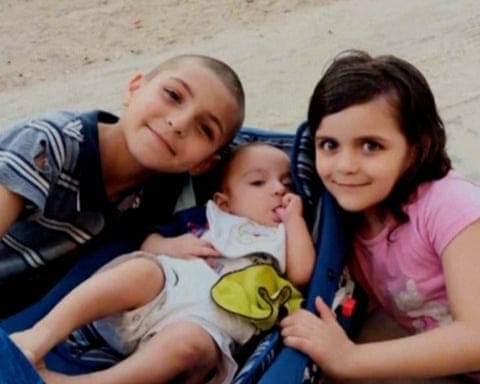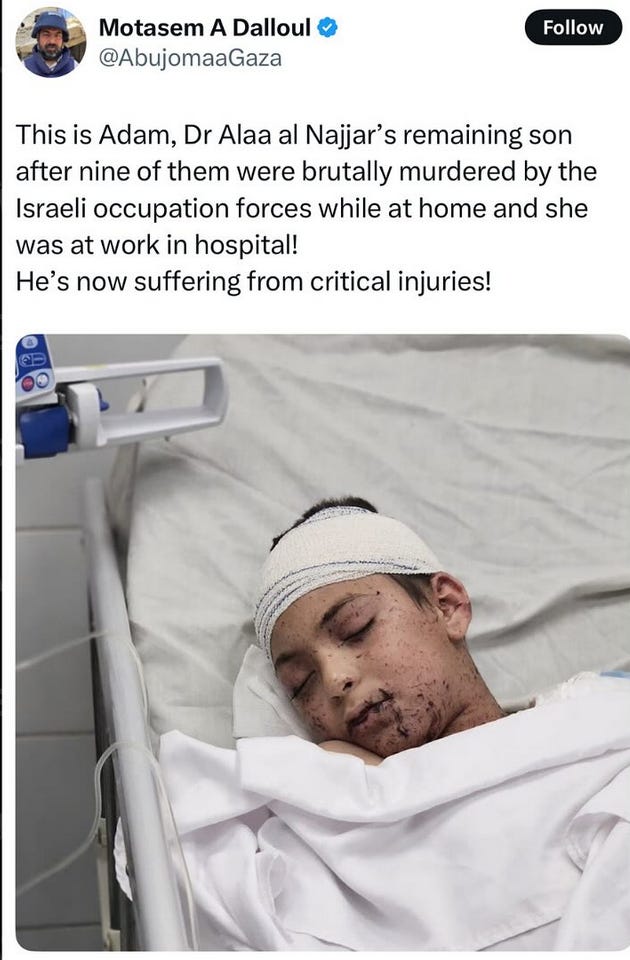DR. ALAA AL QATRAWI'S SUBSTACK A Letter to Dr. Alaa al-Najjar To the Mother Who Lost 9 Children: "I do not only share your name, Alaa’, I share your test."
DR. ALAA AL QATRAWI'S SUBSTACK
Home
Dear Dr. Alaa Al-Najjar,
Some time ago, a righteous man gifted me a copy of Sunan al-Nasa’i, a collection of hadith, the words of the Prophet Muhammad ﷺ.
By the grace of God, the very first time I opened the book randomly to browse through it, my eyes fell upon this noble hadith:
The Messenger of God ﷺ said:
“No woman loses three of her children except that they become a veil for her from the Fire.”
A woman then asked, “And two?” He replied, “And two.”
Meaning, the bereaved mother sends her children ahead of her to the afterlife.
For a moment, I imagined that perhaps another woman would follow up and ask, “And four?”—but I found no such question. It seems that even the women at the time of the Prophet ﷺ could not imagine asking about more than three dead children.
I found myself wondering: What, then, is the reward for one who has offered four?
Perhaps I could console my heart with something the Prophet ﷺ might have said.
At the very least, I am assured of the highest tier of reward—God granted me four, all of whom are now with Him.
And I wonder: What about someone who has sent forth nine of her children?
How many veils would that be from fire?
I cannot begin to imagine.
But such a station is so immense that to even attempt contemplate it feels limited and inadequate.
I remember asking my mother earlier in the days of my loss:
Why do people offer condolences for my children?
In earnest, I wasn’t in a state of trauma then—I truly, wholeheartedly believed God when He said:
“And do not say of those who are killed in the way of God, ‘They are dead.’ Rather, they are alive, but you do not perceive it.” (Qur’an 2: 154)
So how could I believe the mere hearsay, the words of people, or even their physical graves—and not believe the words of God?
I chose to believe God.
And ever since I made that choice, I’m soothed by a kind of reconciliation that has somehow lightened the burden of this profound trial.
When I contemplated His words,
“…but you do not perceive it,”
I realized: He did not say, “You will never perceive it” (which would negate future perception),
Nor did He say, “You did not perceive it” (which would negate it in the past or present).
Rather, God said: “You do not perceive it,”—a form that leaves room for the continuous, present possibility of perception.
You see, it is not an absolute negation. It implies that perceiving them is possible—depending on the depth of one's conviction.
The verse addresses people who are referred to martyrs as “dead,” and God refuted that, affirming the guarantee of life for them.
Our inability to perceive their continued life, He explained, is due to our lack of awareness—
but if you refrain from calling them dead, and believe them to be alive, as God indicates, then you will surely come to feel their life and presence.
And what a wonder that is,
I say this not as allegory nor abstraction—I have lived this wonder with my four children.
I did not weep for them as someone who mourns a loss,
for I know I have not truly lost them—they are still present.
However, I will not lie to you: I do weep for them every day out of longing, yearning, and aching desire.
And each time, I ask God to bound my longing heart, and to place me among those who are patient, those who seek reward, those who are content with Him and whom He is content with.
Through this, you come to discover in the magnitude of the trial the magnitude of tranquility. Somehow, by Divine grace, you come to grasp the secret behind this strange and wondrous gift.
You come to taste the truth of this verse:
“Indeed, you are under Our watchful eyes.” (Qur’an 52:48)
This is the reward for those who are patient with the decree of the Lord. As if God Himself is saying:
“Would you not, My servant, be content with My decree—and in return, be under My direct gaze?”
How lofty, how beautiful is this meaning when you sit with it?
Who would not wish to sit under the gaze of the Most Merciful, the Most Compassionate, the Beautiful, the Loving, the Helper?
There is no one in the world who can bind your heart together except the Divine.
This is what our master Ya‘qub (Jacob), peace be upon him, came to understand when he said in the face of the loss of his son Yusuf (Joseph). He said:
“I only complain of my sorrow and grief to God.”
Imagine: when I first received the news, I had entrusted my children to God with such conviction that I said to myself: Even if the Zionist forces were to kill everyone in the area, my children would survive.That’s how strong my certainty in God’s protection was.
But when confirmation of their martyrdom came—
and we learned that they had exterminated the entire population of that area and that no one had survived—
I was struck to my core.
In the shock of the moment, I asked God silently in my heart:
“My Lord, did You know that my children were in the house when the IDF bombed it?”
At that exact time, I was reciting my daily portion of the Qur’an and had reached the final verses of Surah Āl ʿImrān.
And, Subḥān Allāh, the moment that question formed in my heart, my eyes landed on this verse:
“No soul can die except by the permission of God.”
It wasn’t just a verse.
It felt like a direct response from God—immediate, real.
It was one of the most astonishing experiences of my life, one I will never forget.
I wept, and said to Him:
“As long as it was by Your permission, my Lord—then I am content.”
And every time my patience runs low, every time my heart tires, I remind myself:
“As long as it was by Your permission, my God—then I am content.”
This conviction has carried me through.
It is not easy to truly comprehend the essence of patience without absolute acceptance.
Admittedly, after going through this trial, I began to grow impatient with the trials of others. I started to feel irritated by people’s frustrations and complaints, because to me, their trials seemed like luxuries. I felt that they could easily move beyond them—through acceptance. I grew weary of how people fixated on what they lack—whether material or emotional—and often wondered:
What if they had experienced what I have?
I do not only share your name, Alaa’,
I share your test.
And truthfully—you have surpassed me in it.
To the point that I feel a sense of humility and shame before you.
I ask God that we may also share a place of truthfulness before the abode of the Sovereign, the Omnipotent.
Take heart my sister, for the hand of the Most Merciful can only pen the decree of goodness. His masterful canvas in our lives as nothing short of beautiful.
And may the blessings and peace of God be upon our master Muḥammad and upon his family.
Originally published in Arabic on Sotour.net on May 30th, 2025.






No comments:
Post a Comment